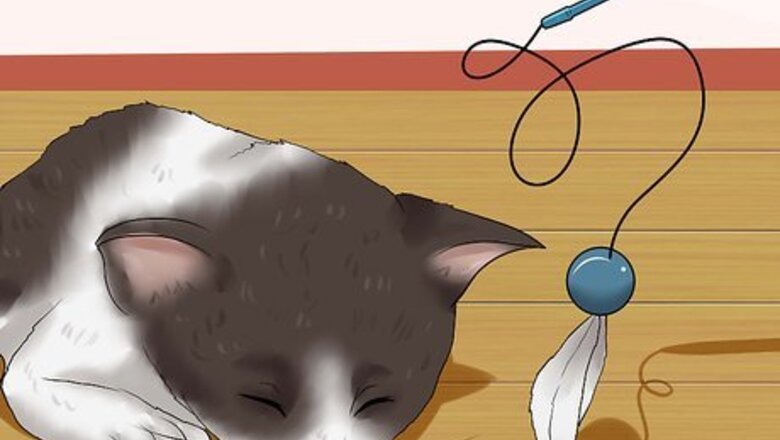
views
Calming a Kitten Down
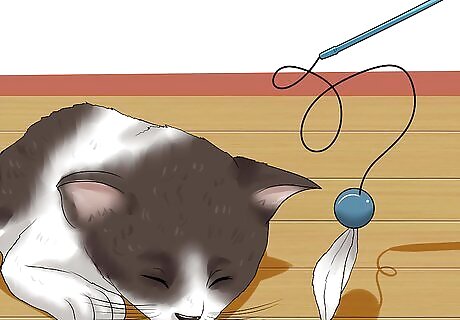
Tire your kitten out with play time. Take the time to play with your kitten every day, multiple times a day if possible. Schedule some play time a couple of hours before you plan to go to bed and use that play time to tire, or tucker out your kitten. If you finish playing with your kitten and find that she’s still in the mood to play, direct her attention to a toy instead. Allow her to continue to prepare for sleep herself with a toy. Some toys to consider are: furry mice, cat balls with or without bells, feathers hanging on a string from a door knob, etc. Using a toy that is attached to a string at the end of a pole (like a fishing rod) is a great way to get your kitten to have a really active play session without requiring you to run around as well. You can stay in one place and use the pole to make your kitten run and jump all around you. Your hands are safe from harm too!
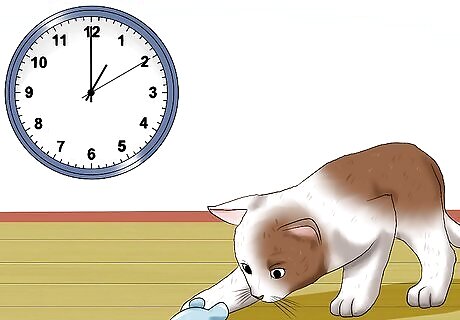
Implement a cool down period at the end of play time. Near the end of play time with your kitten, use slower and gentler movements to encourage your kitten to slow down. Don’t suddenly stop playing with your kitten in the middle of a really active play session. Stopping suddenly when your kitten is still really playful isn’t going to stop her from playing, it may cause your kitten to start chasing after you, or attacking you, because you’re still moving around. If you’re playing with a specific toy during the play session, allow your kitten to catch that toy at the end of play time.

Select special toys to use during play time. Play time with your kitten should be considered a special time of the day. Select certain toys that you only want to use during play time. When it’s not play time, put those special toys away. After a few play periods your kitten will learn which toys are specifically for play time, and when she sees them being taken out, she’ll get excited! Your kitten should always have some toys available to her to play with at all times of the day. However, you might want to hide toys that make a lot of noise (e.g. those made with hard plastic, or those that have bells or sounds) before you go to bed at night. Pick toys that stimulate your kitten’s natural hunting sequence, like a wand toy.

Feed your cat right after play time. A cat’s natural behaviour is to eat, then clean herself, then go to sleep. You’ve already tired your kitten out with play time, so feed her right afterwards. Your kitten will likely complete her natural cycle by going to clean herself up and then having a nap.
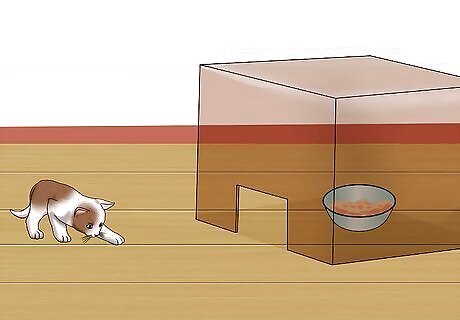
Get your kitten to work for her food. Instead of leaving food out for your kitten all the time, have your kitten work for her food. There are many commercial products you can buy specifically for hiding food. Your kitten then has to work to find and remove the food from the toy in order to eat it. You can also make food puzzles for your kitten with cardboard boxes or other items. Look for specific ideas on the internet. Making your kitten work to get to her food will also help to tire her out. This is especially helpful at the end of the day when you’re near bedtime.

Make a startling sound to make your kitten pause. If your kitten is really hyper, or playfully attacking you, and you need to encourage her to stop, consider making a sudden noise that will startle your kitten. The purpose of the noise isn’t to scare your kitten, but rather to make her pause long enough to reassess the situation.
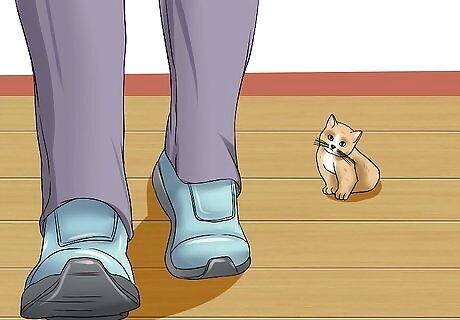
Stop playing with your kitten if she gets too rough. If your kitten starts to play too rough, either during play time or on her own, stop giving your kitten attention. Do not encourage the behaviour by continuing to give your kitten attention. Instead, by ignoring your kitten, you’re sending a signal that this behaviour is inappropriate and you will not pay attention to such behaviour.

Adopt kittens in pairs. The best playmate for a kitten is another kitten. Kittens adopted together, especially if they’re from the same litter, can grow up to have a close relationship with each other. As kittens they’ll play with each other and tire each other out. They’ll also teach each other when certain behaviours are inappropriate.
Dealing with a Nervous Kitten
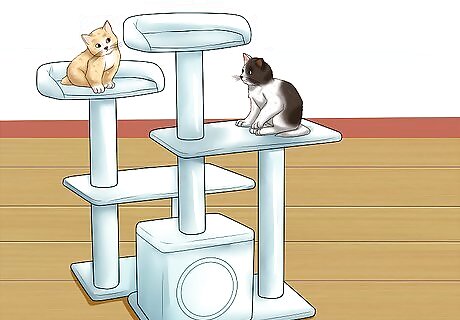
Provide your kitten with a tall cat tree or cat condo. Cats, in general, like to be up high where they can see everything going on. This is one of the reasons cats like to climb on top of tall shelves or the fridge. Providing your kitten with a tall cat tree or cat condo will give her a spot she can go to that makes her feel comfortable. Having a spot like this when something scary is happening can be especially helpful. For example, your kitten may prefer to sit in the cat tree when you are running the vacuum or watching a loud movie.
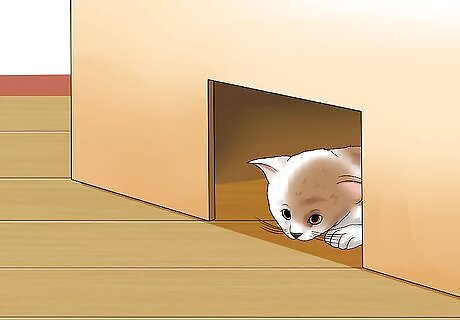
Give your kitten a place to hide. While you don’t want to have furniture that has a hiding spot where your kitten can get stuck, it is a good idea to provide your kitten with a safe spot to hide when she’s feeling nervous or scared. A cat tree with a cubby, or a cat tent, are great options. Since you are probably already aware that cats love boxes, providing one or more boxes for your kitten to hide in will also work. It is also a good idea to have more than one of these hiding spots for your kitten. You might want to put one in each of the main rooms your kittens hangs out in.
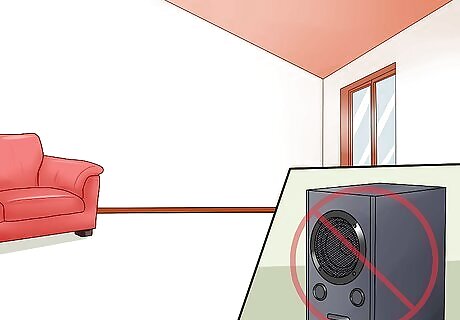
Keep your home quiet. A nervous kitten is likely to be scared of everything. The best thing you can do for a nervous kitten is to remove as many of the scary items as possible. This includes keeping the house (or room) as quiet as possible and slowly introducing sounds over time. Scary sounds might include the TV, radio, vacuum, washing machine, dishwasher, fans, etc. If your kitten is in her own room, try playing calming sounds or a radio at a low volume in that room to acclimatize your kitten to noises.

Try herbal remedies to keep your kitten calm. There are several herbal remedies made specifically for cats that can help them keep calm and reduce anxiety. Depending on the type of remedy, you may be able to put it in your kitten’s water, or in her ears. Some cats are also calmed by the scent of lavender or honeysuckle. Using either the essential oils of lavender or honeysuckle, or a spray made from the essential oils, may help keep your kitten calm. Do not put the spray or essential oil directly onto your kitten. Instead spray it on their bedding, toys, etc.
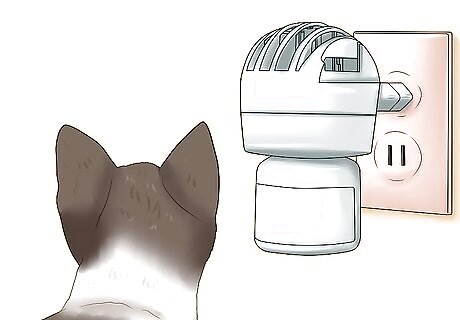
Use feline pheromones to reduce your kitten’s anxiety. Feline pheromones keep cats calm and reduce their anxiety. Man-made versions of these pheromones are available in spray and plug-in formats that can be placed in your home to help keep cats and kittens calm. These pheromones are similar to the ones cats release when they rub their chins and faces against something when they’re happy.
Preparing for a Hyper Kitten
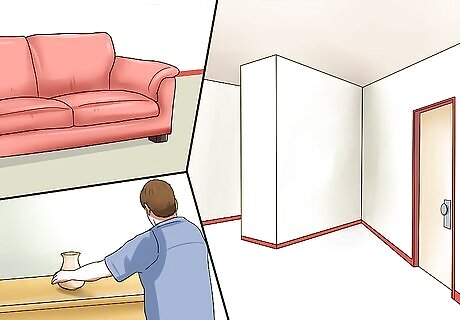
Prepare your home for a new kitten. When you bring a new kitten into your home you should take the time to kitten-proof your home. Kittens are hyper and don’t yet understand what they can and cannot do. Preparing your home for an inevitable disaster will protect your belongings and help teach your kitten good behaviour. Remove breakable or delicate items from tables or lower-level shelves. Tie up the strings attached to blinds and curtains. Remove or change curtains that a kitten may be tempted to climb. Rearrange furniture such that there are no spaces where a small kitten could get stuck behind or underneath things.

Isolate your kitten when you first bring her home. When introducing your kitten to her new home, it is best to start by placing her in a small space, and then allowing her into more of the house as time goes on. A bedroom or a bathroom is a good place to start. As you introduce your kitten to new areas of your home, supervise her actions until she’s comfortable.
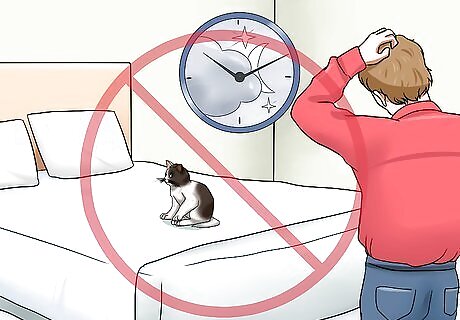
Do not allow your kitten in the bedroom at night. If your kitten wakes up in the middle of the night and then tries to wake you up, the most important thing you need to remember is NOT to react. If your kitten wants to play, or wants something to eat, do not give in to her demands. Giving into your kittens demands will teach her it’s okay to wake you up to get what she wants. If night time disturbances are a problem, you may need to close your bedroom door and not allow your kitten inside your bedroom at night.




















Comments
0 comment